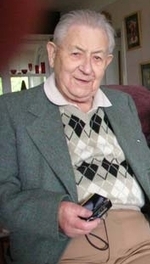Andrew Donald Booth facts for kids
Quick facts for kids
Andrew Donald Booth
|
|
|---|---|

Booth in 2008
|
|
| Born | 11 February 1918 East Molesey, Surrey, England
|
| Died | 29 November 2009 (aged 91) Sooke, Vancouver Island, British Columbia, Canada
|
| Nationality | English |
| Alma mater | Jesus College |
| Known for | Booth's multiplication algorithm |
| Spouse(s) | Kathleen Booth |
| Scientific career | |
| Fields | Computer science, Physics, Electric engineering |
| Institutions | Birkbeck College, University of London, Lakehead University |
Andrew Donald Booth (born February 11, 1918 – died November 29, 2009) was a British scientist. He was an electrical engineer, physicist, and computer scientist. He helped create some of the very first computers. He is especially known for inventing a clever way for computers to do multiplication, called Booth's multiplication algorithm. Later in his life, he moved to Canada and became the head of Lakehead University.
Early Life and Education
Andrew Donald Booth was born in East Molesey, Surrey, UK, on February 11, 1918. He grew up in Weybridge, Surrey. He went to Haberdashers' Aske's Boys' School. In 1937, he won a special scholarship to study mathematics at Jesus College, Cambridge. However, he decided to get his degree from the University of London instead, where he earned top marks.
Building Early Computers
From 1943 to 1945, Andrew Booth worked as a physicist. He studied materials using X-rays and earned his PhD in crystallography. Crystallography is the study of how atoms are arranged in crystals.
In 1945, he moved to Birkbeck College. There, he started building some of the first electronic computers in the United Kingdom. One famous computer he helped create was the APEXC, which stands for "All Purpose Electronic Computer."
Booth also started a new department at Birkbeck. This department focused on how computers could do calculations automatically. He also did important early work on getting computers to translate languages. This field is now called machine translation. He learned about the ideas of famous computer pioneers like Alan Turing.
Andrew Booth also helped develop magnetic drum memory. This was an early way for computers to store information. It was like a spinning drum that could hold data.
Later in his career, from 1972 to 1978, Dr. Booth became the President of Lakehead University in Canada.
Family Life
Andrew Booth married Kathleen Britten in 1950. She was also a mathematician and computer engineer. Together, they had two children, Amanda and Ian. Between 1947 and 1953, Andrew and Kathleen worked together to build three different computing machines.
See Also
- Booth's multiplication algorithm
 | Precious Adams |
 | Lauren Anderson |
 | Janet Collins |

